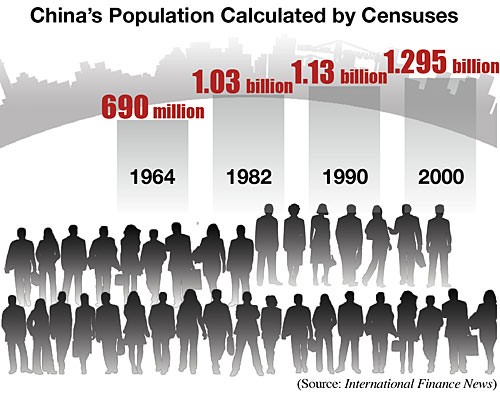|
 In Beijing, most residents received a mobile-phone message over the weekend before November 1, asking them to cooperate in a friendly way. In Beijing, most residents received a mobile-phone message over the weekend before November 1, asking them to cooperate in a friendly way.
At a mobilization speech broadcast nationwide on radio and TV on October 28, Vice Premier Li Keqiang asked people to cooperate with the census takers so that the statistics will be more accurate.
Li promised any personal information collected will be kept strictly confidential.
Essential for decision-making
Giving an example on how inaccurate census statistics could misguide the government's policies, Zhang said the acute shortage of kindergartens at present in some cities is partly caused by the failed effort to count all children during the last census in 2000.
"Our total fertility rate calculated by the last census is 1.3, which was as low as that of developed countries like Japan. This figure wasn't credible at all," said Zhang. He estimates as many as 1 to 2 percent of children were not counted in some rural areas and some of them were later taken by their parents to cities, leading to overcrowded kindergartens.
Zhang noted that the most important data collected by this census would be the fertility rates, the population of the elderly citizens and the gender ratio at birth.
According to Zhang's studies on China's demographic changes over the last few years, China's fertility rate has kept dropping, which is related to the rising ages of marriage for both men and women. Meanwhile, the significant improvement of medical insurance and nutritional conditions for the general population has greatly boosted the life expectancy.
"The lower birth rates and the higher life expectancy have meant that China is aging at an even faster speed," said Zhang.
He added that China's newly added labor forces per year have been shrinking for years and the country's labor pool will show negative growth as early as 2020. Detailed age structure information will be used for accurately predicting the changes of labor forces and deciding how fast China should upgrade its industrial structure by phasing out its labor-intensive industries.
The detailed distribution information about China's senior citizens will also be used to decide where nursing homes, retirement homes and other facilities for senior citizens should be built, said Zhang.
Zhang also said the government might need to loosen up the family planning policies if the fertility rate is at a low level.
China's other demographic shift is its skewed sex ratio at birth, which had 116 boys for 100 girls in 2000 to 119 boys for 100 girls in 2009, according to Zhang. "That means when the next generation reach their marriage age, a large number of men, especially those in disadvantageous financial positions, will not be able to find a spouse," said Zhang.
Talking about why foreigners living on the Chinese mainland are included in the survey for the first time, Zhang explained that the expatriate population was negligible during China's previous five censuses while big cities in China today have a large population of foreigners working or studying. He said Beijing alone has about 600,000 foreign residents.
"Learning about their basic information will help the government to allocate resources and provide public services for them," Zhang said. "Over the next five years, providing public services for residents will become a more important government function, including for foreigners." | 